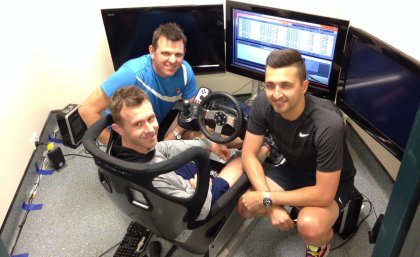V8 Supercar drivers chase accelerated results
The quest to find even the slightest advantage has led V8 Supercars team Brad Jones Racing to the University of Queensland.

Ahead of the Ipswich 400 at Queensland Raceway, the drivers rolled up for physical testing with UQ School of Human Movement and Nutrition Sciences PhD candidate Justin Holland.
Fabian Coulthard, Jason Bright and Dale Wood spent time on a computerised simulator and had their strength, cardiovascular output, blood and body composition analysed.
“In this sport you are looking for any little edge you can get,” 500-race veteran Jason Bright said.
“The difference between fifth and fifteenth in V8 Supercars is 0.2 of a second over a lap.
“We’re constantly making tiny adjustments to our vehicles to shave the smallest margins off, so it makes sense we look at the drivers to see where we can do better.”
University of Queensland researcher Mr Holland, who also works with the Ipswich Jets rugby league team, said he believed improved fitness could contribute to better lap times.
The drivers reported using a variety of training methods to keeping fit, from boxing to swimming, running and cycling.
Mr Bright said race temperature inside a vehicle could reach 60 degrees Celsius and—with drivers wearing a helmet, gloves, balaclava and fire-retardant clothing—the ability to stave off fatigue was critical.
This season Mr Coulthard is positioned third in the rankings, with Mr Bright 13th and Mr Wood 20th.
“When I did my undergraduate at UQ it was always a passion and a dream to be working in the motorsports industry,” Mr Holland said.
“To have them come along today was an absolute godsend and I’m very grateful to Brad Jones Racing for making it happen.”
Mr Holland said UQ researchers had completed more than 220 laps of Bathurst’s famous Mount Panorama course on the driving simulator in preparation for the visit by Brad Jones Racing.
The best time posted by an academic was a respectable 2 minutes and 10 seconds, not far adrift of the 2:7.4 set last year on the actual track by V8 Supercars driver Chaz Mostert.
Mr Holland will continue to work with Brad Jones Racing in coming months, specifically in relation to testing driver hydration.
About the UQ School of Human Movement and Nutrition Sciences
The UQ School of Human Movement and Nutrition Sciences offers a range of high-quality undergraduate, postgraduate and research programs in the interdisciplinary areas of human movement and nutrition, which includes, but is not limited to, clinical exercise physiology, exercise science, health sport and physical education, dietetics and coaching.
The school provides world-leading staff and state-of-the-art facilities which provide students with a world-class education.
The university takes an interdisciplinary approach to research, which is critical to allow effective translation of research outcomes for policy and practice.
The school’s research is diverse and focuses on addressing multi-dimensional questions related to how and why humans move and obtain nutrition. Areas of focus include critical to health and disease prevention across the lifespan including exercise, physical activity and health, dietetics and nutrition, sensorimotor neuroscience, sport, physical and health education.
*

































Ask A Question
Ask us about your program of interest, or if you have a question about our services.
CONTACT US TODAY